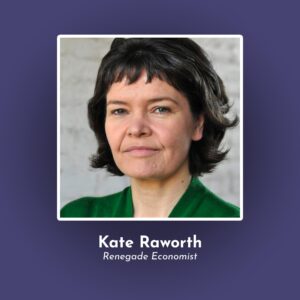
Show Summary
On this episode, Nate is joined by the creator of Doughnut Economics, Kate Raworth, to discuss alternative economies that measure more than just the material wealth created by a society. As we expand further past planetary boundaries, the gap between the standard of living of the materially wealthiest and poorest continues to grow. Increasingly, these shortfalls in both ecological and social well-being of the current economic system are becoming more recognized by the general populace. Can we create systems that keep people from falling down the cracks, while also respecting the limits of our planetary home? Are there governments and businesses already aligning themselves to these principles and shifting to a different way of leading? Could moving towards a holistic system, such as Doughnut Economics, be enough to overcome the energy hungry growth of a global Superorganism?
About Kate Raworth
Kate Raworth describes herself as a renegade economist focused on making economics fit for 21st century realities. She is the creator of the Doughnut of social and planetary boundaries, and co-founder of Doughnut Economics Action Lab, based on her best-selling book Doughnut Economics: 7 Ways to Think Like a 21st Century Economist. Kate is a Senior Associate at Oxford University’s Environmental Change Institute, where she teaches on the Masters in Environmental Change and Management. She is also Professor of Practice at Amsterdam University of Applied Sciences. She is a member of the Club of Rome and currently serves on the World Health Organisation Council on the Economics of Health for All.
In French, we have a motto that says that a simple drawing is often better than a long explanation. Jean-Marc Jancovici Carbone 4 President
That’s very understandable because with left atmosphere thinking, one of the problems is that you see everything as a series of problems that must have solutions. Iain McGilchrist Neuroscientist and Philosopher
We can’t have hundreds and hundreds of real relationships that are healthy because that requires time and effort and full attention and awareness of being in real relationship and conversation with the other human. Nate Hagens Director of ISEOF
This is the crux of the whole problem. Individual parts of nature are more valuable than the biocomplexity of nature. Thomas Crowther Founder Restor
Show Notes & Links to Learn More
Download transcript00:10 – Kate Raworth works, info, Doughnut Economics Action Lab, images from the episode
03:55 – Planetary Boundaries
04:02 – Herman Daly + TGS Episode
04:20 – Donella Meadows, Thinking in Systems: A Primer
07:35 – Keynes
11:25 – Supply and Demand graph
12:50 – Homo economicus
13:39 – We are the most social of all mammals
15:59 – Nothing grows forever
23:37 – Milton Friedman
25:21 – Amsterdam’s Circular Initiatives
27:20 – Grenoble, France
28:35 – Private Sufficiency, Public Luxury – George Monbiot
33:40 – The role of policy in changing incentives
34:26 – Margorie Kelly – Regenerative Ownership
40:45 – Dennis Meadows + TGS Episode
41:05 – Long Term Stock Exchange
44:02 – Care Economy
44:53 – Capitalist-Socialist False Dichotomy
46:44 – Elinor Ostrom
47:07 – Tragedy of the Commons and Overcoming it
48:45 – Reagan and Thatcher policies rolling back the state’s role in the economy
58:14 – Surplus and Inequality
1:02:01 – Low Income, Middle Income, High Income Nations
1:04:21 – DEAL report on countries performance based on the Doughnut Economy
1:05:31 – Norway success in scaling EVs, but non-impact on oil consumption
1:05:50 – Norway Oil production
1:10:01 – G20
1:12:29 – Beyond Growth
1:12:45 – Ursula von der Leyen
1:13:56 – Kate’s presentations at Beyond Growth
1:14:53 – Thomas Arnold (Doughnut4EU)
1:17:23 – Bhutan, Gross National Happiness
1:21:18 – Degrowth, post-growth
1:26:26 – Advance Policy
1:35:25 – Janine Benyus
1:39:27 – Humans are an interdependent part of the economic web
1:42:03 – Reality Roundtable







